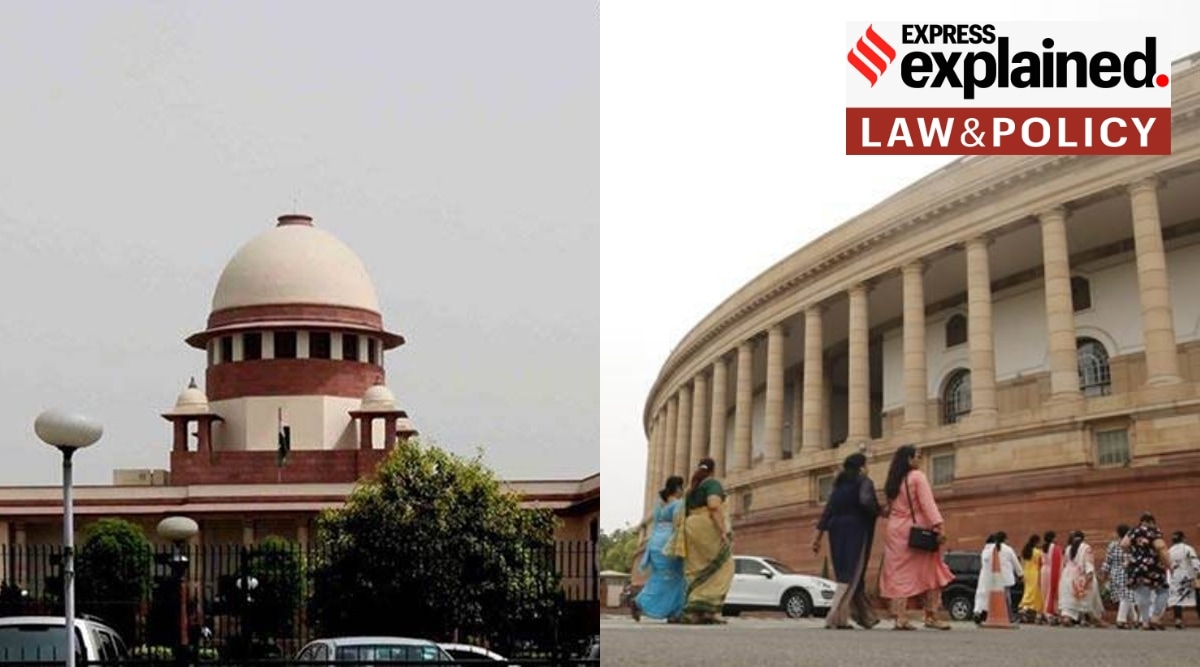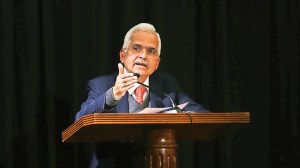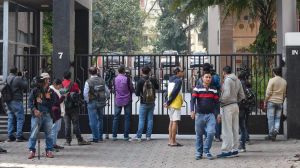Before Delhi ‘services’ case, other instances of Govt overturning SC’s orders
The Centre's ordinance effectively nullifies the Supreme Court's decision granting the Delhi government power over services in the capital. This is not the first time the central government has overturned the apex court's decision. We take a look at some prior instances.
 This is not the first time the Centre has nullified a judgement by the Supreme Court with legislative action. (File)
This is not the first time the Centre has nullified a judgement by the Supreme Court with legislative action. (File) The Centre on Friday (May 19) promulgated an Ordinance extending the powers of the Delhi Lieutenant Governor (LG) over services in the administration of the national capital, which essentially involves the power to transfer and appoint bureaucrats posted to Delhi.
The Ordinance seeks to undo the effect of the unanimous verdict of the five-judge Constitution Bench led by Chief Justice of India (CJI) D Y Chandrachud, which gave the Delhi government power over administrative services in the national capital.
This is not the first time that action has been taken to undo or reverse a decision of the Supreme Court, either through the promulgation of an Ordinance or by the passage of a law in Parliament. Some examples:
The Tribunals Reforms (Rationalization and Conditions of Service) Bill, 2021
The Tribunal Reforms Bill was introduced in Lok Sabha on February 13, 2021. As the Bill remained pending at the end of the session, an Ordinance with similar provisions was promulgated in April 2021.
The Ordinance sought to dissolve certain appellate bodies and transfer their functions to other existing judicial bodies. It also aimed to fix the term of office of the Chairperson and members of the Tribunal at four years, subject to an upper age limit of 70 years for the Chairperson, and 67 years for other members.
The Ordinance was challenged in the Supreme Court over its lack of compliance with earlier judgments of the court including ‘Madras Bar Association vs Union of India & Anr’ (2020), wherein the court prescribed the minimum office tenure as five years.
In 2021, the SC in a 2-1 majority ruling struck down the provisions of the Ordinance relating to the minimum age requirement of 50 years for appointment of the Chairperson or members, and the four-year tenures, reiterating that “executive influence should be avoided in matters of appointments to tribunals”.
However, a month later, Parliament passed the Tribunals Reforms Act, 2021, with the same provisions that the SC had struck down.
This led to the Madras Bar Association filing a petition before the SC challenging the new Act. In September 2021, a three-judge Bench led by then CJI N V Ramana and Justices Chandrachud (now CJI) and L Nageswara Rao began hearing the challenge to the Act along with other pleas on vacancies in tribunals. The matter remains to be decided.
The Finance Act, 2012
In May 2007, the mobile network operator Vodafone bought a 67% stake in the (now defunct) Hong Kong-based investment holding company Hutchison Whampoa for $11 billion, which included its mobile telephone business and other assets in India.
In September of that year, the Indian government raised a demand for Rs 7,990 crore in capital gains, saying the company should have deducted the tax at source before making the payment to Hutchison Whampoa.
Vodafone challenged the demand notice in the Bombay High Court, which ruled in favour of the Income-tax Department. Subsequently, Vodafone challenged the High Court judgment in the Supreme Court, which in 2012 ruled that the Vodafone Group’s interpretation of the Income-tax Act, 1961, was correct, and that it did not have to pay any taxes for the purchase of the stake.
That same year, then Finance Minister in the UPA-2 government, the late Pranab Mukherjee, circumvented the Supreme Court’s ruling by proposing an amendment to the Finance Act, which gave the Income-tax Department the power to retrospectively tax such deals. The Bill, which was passed by Parliament in May 2012, shifted the onus of paying the taxes back to Vodafone.
The 2012 legislation allowed the government to tax certain products, items, services, and deals and charge companies retrospectively, that is, from a time before the date on which the law was passed. Usually, countries use retrospective taxation to remedy any loopholes in their taxation policies that previously allowed corporations to take advantage. However, it ends up “hurting companies that had knowingly or unknowingly interpreted the tax rules differently”.
Amendment to the SC-ST (Prevention of Atrocities) Act, 1989
The issue first arose in March 2018 when the Supreme Court in ‘Kashinath Mahajan v State of Maharashtra’ directed that no arrests under the SC-ST Act could be made without prior permission — from the appointing authority in the case of public servants, and the Senior Superintendent of Police (SSP) for others — and said that a preliminary inquiry should be conducted before registration of an FIR.
The judgment was widely criticised as “diluting” the legal protection against atrocities that is available to some of India’s most vulnerable sections of society. In August 2018, Parliament passed an amendment inserting Section 18A in the 1989 Act, allowing for automatic arrest in cases concerning atrocities against SC-STs without an FIR or prior permission.
The amendment also said that persons accused of committing an offence under the 1989 Act will not be eligible for anticipatory bail.
After several petitions challenging the 2018 amendment reached the SC, the court clubbed them together with the pleas seeking a review of the 2018 verdict in ‘Kashinath Mahajan’.
Two years later, in its 2020 ruling in ‘Prithvi Raj Chauhan v. Union of India’, a Bench of Justices Arun Mishra, Vineet Saran, and Ravindra Bhat disposed of the pleas while upholding the constitutional validity of the 2019 amendment to the 1989 Act.
The court also clarified that the provision of anticipatory bail will not apply to cases under the Act, except when no prima facie case is made out.
Earlier incidents of legislative actions undoing SC decisions
*One of the first instances of the legislature nullifying the effects of an SC judgment dates back to the 1951 ruling in ‘The State Of Madras vs Srimathi Champakam Dorairajan’, which held that the State cannot reserve seats for providing admission to candidates based on their religion, caste, or race.
Parliament enacted The Constitution (First Amendment) Act, 1961, which inserted clause (4) under Article 15, allowing circumvention of the judgment. Under Article 15(4), the government can reserve seats in state-run or state-aided institutions for backward classes.
* This was followed by Parliament nullifying the 1975 SC ruling in ‘Indira Nehru Gandhi vs. Raj Narain’, in which the Allahabad HC order setting aside then Prime Minister Indira Gandhi’s election was challenged. As this case was being heard by the top court, Parliament passed the 39th Amendment in 1975, introducing Article 392A in the Constitution.
Article 392A forbade any challenge to the elections of the President, Vice President, Prime Minister, and Lok Sabha Speaker in any court in the country.
The 39th Amendment was subsequently struck down, with the Supreme Court for the first time applying the principle of the inviolability of the ‘basic structure’ of the Constitution, which it had laid down in the landmark Kesavananda Bharati judgment of 1973.
* In 1986, Parliament passed the Muslim Women (Protection of Rights on Divorce) Act, 1986, which nullified the Supreme Court’s 1985 decision in the Shah Bano case, which had upheld Muslim women’s right to alimony even after the ‘iddat period’, or the waiting period a woman must observe after her husband’s death or divorce.
The 1986 Amendment, pushed through Parliament by the government of Prime Minister Rajiv Gandhi, said that maintenance can only be paid during the iddat period, and if a woman is unable to provide for herself, the magistrate can direct the Wakf Board to provide for her.
(Aditya Jain is an intern with The Indian Express)
- 01
- 02
- 03
- 04
- 05






































